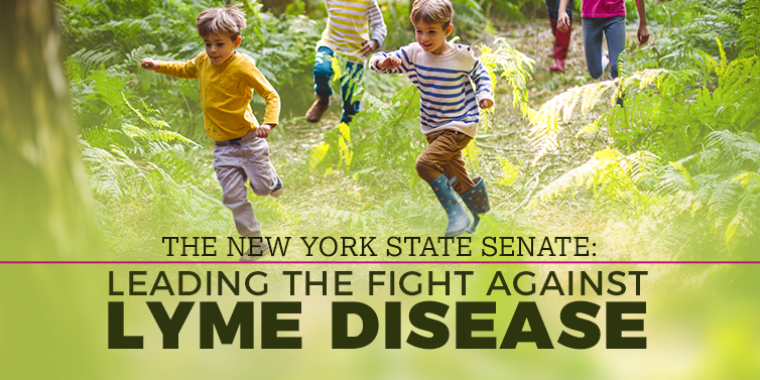
New York State Senate Passes Comprehensive Legislative Package Protect Residents From Lyme And Tick-Borne Diseases
May 17, 2018

Senate Majority Leader John Flanagan (2nd Senate District) announced that the New York State Senate has passed measures to strengthen the state’s efforts to combat Lyme and tick-borne diseases. As our region heads into summer when ticks become active once again, this legislative package assists in implementing the goals of the Senate’s Task Force on Lyme and Tick-Borne Diseases by increasing public awareness and prevention and improving diagnosis and treatment to better protect the health of all New Yorkers.
In addition to today’s package of comprehensive bills, the Senate also approved a resolution (J4517) today designating May 2018 as Lyme Disease Awareness Month in the State of New York. The resolution helps focus on this significant and complex disease, provides information on and raises public awareness of its causes, symptoms, and treatments, and underscores important education and research efforts surrounding Lyme and tick-borne diseases.
“As many in our state are unfortunately aware, Lyme disease and other tick-borne diseases are a major health issue for New Yorkers. Led by Senators Sue Serino, the Chairwoman of the Senate's Task Force on Lyme and Tick-Borne Diseases, and Kemp Hannon, Chairman of the Senate Committee on Health, the Senate has continually taken meaningful steps to raise public awareness and help fight this epidemic, and this legislative package is the next step in that effort. Additionally, the Senate has prioritized making state monies available to combat Lyme disease -- resources that will only grow and become more effective when the Governor's Budget Division signs off on the latest round of funding we submitted last week. It is our hope that the Governor is ready to work with us to turn the tide in this public health fight to protect our residents,” stated Senator Flanagan.
According to reports by the Centers for Disease Control (CDC), New York State has the third highest number of confirmed cases of Lyme disease in the entire country. Over the last decade, the number of people getting diseases transmitted by mosquito, tick, and fleabites has more than tripled across the country. While this problem has historically been concentrated on Long Island and in the Hudson Valley, the state DOH reports that it is quickly migrating to other counties across New York. Since Lyme reporting became available in 1986, there have been over 95,000 cases of Lyme in New York State alone.
While the Northeast United States remains one of the hardest-hit regions for Lyme and other tick-borne diseases, the Senate has been actively working to help reverse this trend. The Task Force, which was created in 2013, has continued to engage stakeholders and develop legislation to address the epidemic. During this year’s budget negotiations, the Task Force was instrumental in securing $1 million – a record level of funding – to support ongoing education and prevention efforts.
Senator Serino (41st Senate District), Chair of the Senate’s Task Force, said “New York has been at the epicenter of the Lyme and tick-borne disease epidemic for far too long. Coupled with the unprecedented $1 million that the Task Force was able to secure in this year's state budget, each of these bills aims to leverage awareness and prevention to play a role in reversing that trend. By improving diagnostics, increasing awareness, better protecting our children, empowering New York's homeowners, and working towards providing critical insurance coverage, we can give New Yorkers the tools they need to protect themselves against the scourge of these devastating diseases. I thank my colleagues on the Task Force for joining me in this fight and for recognizing the importance of swiftly tackling this epidemic. I urge my colleagues in the Assembly, as well as the Governor, to follow our lead and make these bills a priority before the end of the legislative session.”
Senator Hannon (6th Senate District), Chair of the Senate Health Committee, said, “Preventing, detecting and treating tick-borne diseases is a major set of public health goals for New York State."
Legislation passed today builds upon the progress already made by the Task Force to address the spread of Lyme and other tick-borne diseases and includes:
Expanding Education and Public Awareness
S2588, sponsored by Senator Serino, provides homeowners with vital and reliable information on the best way to protect their property from ticks. People should be made more aware of the EPA’s approved pesticides that are recommended for tick prevention and the best methods to use pesticides to better protect both people and pets from exposure to ticks on their property. The bill directs the Department of Environmental Conservation (DEC) to develop guidelines for best practices in treating residential properties to reduce exposure to ticks.
S7242, sponsored by Senator Serino, directs the New York State Office of Parks, Recreation and Historic Preservation to install and maintain tick warning signs at all state-managed parks, including trail entryways and campgrounds. The signs will inform the public that ticks may be found in such areas and that they can spread Lyme or other diseases.
Promoting Prevention and Strengthening Treatment
S7169, co-sponsored by Senators Serino and Hannon, establishes a pilot program for Lyme and tick-borne disease testing in children under the direction of the Commissioner of Health. This legislation will allow health care practitioners and providers to submit samples to exclude Lyme and tick-borne diseases from children who present with clinical diagnoses that have similar symptoms to these illnesses. The qualifying medical institution or laboratory chosen by the commissioner would be required to submit a report on health outcomes to DOH, as well as develop a graduate medical education curriculum to teach medical students about these illnesses.
S8534, sponsored by Senator Serino, directs the Commissioner of Education and the Commissioner of Health to promulgate and review rules and regulations related to pupils who have a tick removed from them during school or a school-sponsored activity. Both commissioners will be required to issue guidance to educators, particularly school nurses, regarding the removal of ticks from students and notification of parents. This legislation also provides for the development of informational materials on Lyme and tick-borne diseases for school districts and parents.
S8539, sponsored by Senator Serino, requires the Department of Financial Services, in consultation with the DOH Commissioner, to conduct a study considering the current scope of health insurance coverage for Lyme and tick-borne diseases. The study will also examine initiatives in other states and the fiscal implications of various proposals.
S6926, sponsored by Senator Hannon, directs the Commissioner of Health to establish a standard protocol for the diagnosis and treatment of Lyme and other tick-borne diseases. This legislation requires the commissioner to work with health care providers and experts to develop a standard protocol process and patient notification of related symptoms, risk factors, diagnosis, and other information relating to Lyme and TBDs.
S7168, co-sponsored by Senators Serino and Hannon, requires a coroner, pathologist, medical examiner or other qualified examiner that discovers Lyme and tick-borne disease infections during an examination of a deceased person to report the case to the DOH. The legislation is a result of a recent Task Force forum, in conjunction with the Senate Health Committee, to provide appropriate surveillance and statistic accounting in cases where Lyme and TBDs underlie the primary cause of death.
S7208, co-sponsored by Senators Serino and Hannon, requires that the Council on Human Blood and Transfusion Services review current medical research and guidance regarding the donation of blood by patients with a history of Lyme or tick-borne illnesses. Concerns about blood donations and transfusions of blood with TBDs are not unfounded. In order to safeguard the state’s blood supply, its recipients, and prevent the potential spread of the disease, the council will research these concerns and make recommendations about blood donations to the Commissioner of Health based on currently available medical research.
S3816, sponsored by Senator Kenneth LaValle (1st Senate District), allows the Town of East Hampton to establish a tick control district. This legislation creates a dedicated and sustainable local funding source, which enables towns to raise necessary funds to undertake and implement a variety of safe and effective tick control measures to further protect public health, wildlife, and the environment.
The bills have been sent to the Assembly.
For more information about the Task Force go to: https://www.nysenate.gov/committees/task-force-lyme-and-tick-borne-diseases.
Share this Article or Press Release
Newsroom
Go to NewsroomStatement From Senate Republican Leader Flanagan
May 22, 2019

Standing With Crime Victims Families
May 16, 2019


